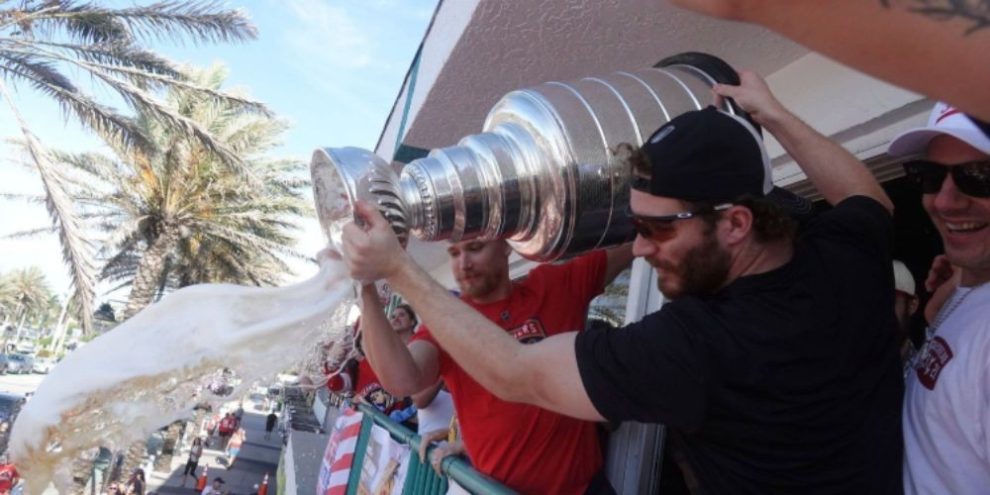
An 84-game season is coming to the NHL as part of an extension of the collective bargaining agreement that has been tentatively agreed to by the league and the Players’ Association.
They announced the deal Friday in Los Angeles before the first round of the draft. It still needs to be ratified by the Board of Governors and the full NHLPA membership.
Two games are being added to to the regular season, the maximum length of contracts players can sign is being shortened and a salary cap will be implemented in the playoffs for the first time, two people told The Associated Press on Thursday.
The NHL and NHLPA began negotiations in earnest this spring after agreeing at the 4 Nations Face-Off in February to jointly hold a World Cup of Hockey in 2028. With revenue breaking records annually and the cap increasing exponentially in the coming years, Commissioner Gary Bettman and union executive director Marty Walsh voiced optimism about reaching an agreement quickly. There were no disagreements on a host of major issues like in previous bargaining talks.
Barrie's News Delivered To Your Inbox
By submitting this form, you are consenting to receive marketing emails from: Central Ontario Broadcasting, 431 Huronia Rd, Barrie, Ontario, CA, https://www.cobroadcasting.com. You can revoke your consent to receive emails at any time by using the SafeUnsubscribe® link, found at the bottom of every email. Emails are serviced by Constant Contact
The extension through 2030 provides the sport extended labor peace since the last lockout in 2012-13, which shortened that season to 48 games. Here is what is changing:
Longer season
Going from 82 to 84 games beginning in 2026-27 — making the season 1,344 total games — is also expected to include a reduction in exhibition play, to four games apiece for the 32 teams.
The additions would be played within divisions, evening out the schedule to ensure four showdowns each season between rivals like Toronto and Boston, Dallas and Colorado and Washington and Pittsburgh. Currently, there is a rotation that has some division opponents facing off only three times a season.
That imbalance is coming to an end, and this is not the first time the NHL has had an 84-game season. The league experimented with that in 1992-93 and ’93-94, when each team added a pair of neutral site games.
Shorter contracts
Since 2013, players have been able to re-sign with their own team for up to eight years and sign with another for up to seven years. Under the new CBA, each would be reduced by a year, to seven for re-signing and six for changing teams.
Top players, given the injury risks in the sport, have preferred the longest contracts possible. The same goes for general managers, eager to keep talent in the fold as long as possible. Nathan MacKinnon, Sebastian Aho, Leon Draisaitl, Juuse Saros, Travis Konecny, Mathew Barzal and, within the past few months, Mikko Rantanen are all among the top players who have signed lucrative eight-year deals.
But with the salary cap getting its biggest increases season by season over the next three years, the thinking had already begun to change. Auston Matthews re-signed for only four years with Toronto last summer, and Connor McDavid could also opt for a short-term contract extension with Edmonton.
Playoff cap
Currently, teams with players on long-term injured reserve can exceed the salary cap by roughly the amount of the players’ salaries until the playoffs begin.
Several times over the past decade, Stanley Cup contenders have used LTIR to activate players at the start of or early in the playoffs after they missed some or all of the regular season.
Florida did so with Matthew Tkachuk before winning the second of back-to-back titles, Vegas has done it with Mark Stone on multiple occasions, Tampa Bay with Nikita Kucherov and Chicago with Patrick Kane.
The rule has been criticized as an unfair loophole, a way to stockpile talent and then add even more for the postseason. After he and Carolina were eliminated by the Lightning in 2021, Dougie Hamilton quipped that the Hurricanes “lost to a team that’s $18 million over the cap.” Tampa Bay went back to back, and players wore T-shirts with that saying on it during their Cup celebration.
That will no longer be possible, though it’s not exactly clear how it will work.





